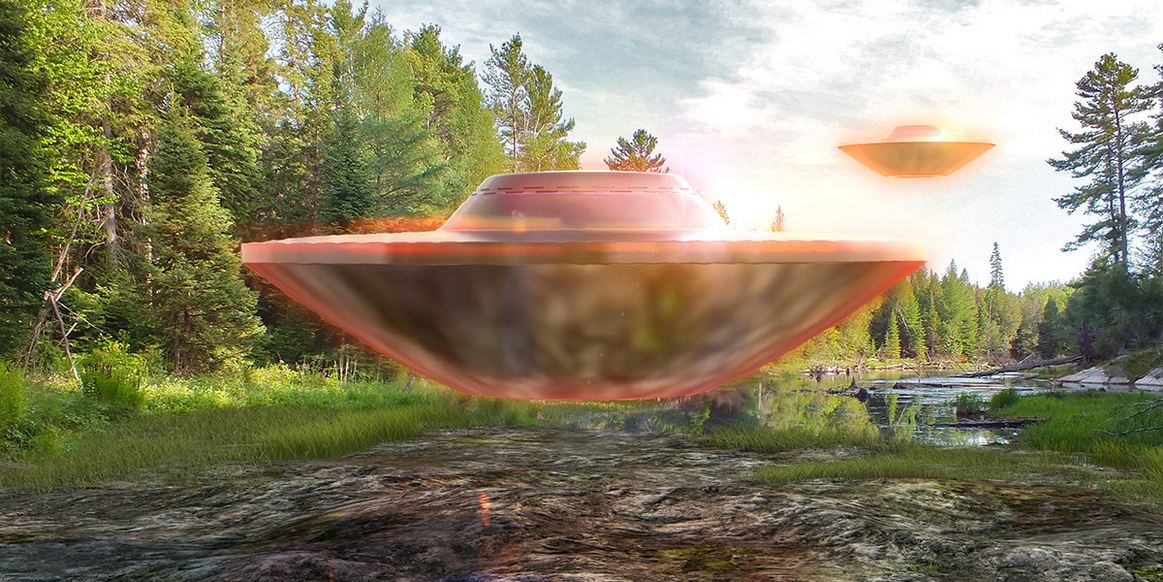|

The
sighting occurred Saturday, May 20, 1967, in an area near
Falcon Lake, Manitoba, Canada, approximately 75 kilometres
north of the American border in the rocky edge of the great
Canadian Shield. Stefan Michalak was an amateur geologist
and had worked the area many times. In his pursuit in finding
silver deposits he traveled from his home in Winnipeg to
Falcon Lake to try his luck. Around 12:15 p.m while working,
Michalak was startled by the cackling of some geese, who
were obviously disturbed by something. He looked up and
was surprised to see two cigar-shaped objects with “bumps”.
The objects now clearly a disc-shaped objects descent together
from the SW at an angle of 15°-20° above the horizon.
One stopped 10-12 ft. above the ground; the other continued
downward, and landed on the flat top of a rock outcropping
160 ft. from him.
The
one in the air when departed was changing colours from a
bright red to orange to grey and so on as it flew into the
west, where it disappeared into the distance. Now focusing
his attention to the object on the ground, Michalak saw
that it, too, was turning from bright red to orange to grey,
until it finally was the colour of iridescence of hot stainless
steel, surrounded by a golden-hued glow. The craft had no
markings. Intense purple light shone from apertures around
the dome of the craft. For the next half-hour he stayed
near the rock, making a sketch of the object and noting
various features. The craft was saucer-shaped, about 35
to 40 feet in diameter and approximately 8 feet high. Its
upper cupola or dome was an additional three feet high.
Michalak became aware of waves of warm air radiating from
the craft, accompanied by the “smell of sulphur.”
He also heard the whirring of what sounded like a fast electric
motor, and a hissing, as if air were being taken in.
He
noticed that a hatch on the side of the craft had opened.
Initially, he could see nothing inside, because the light
was too bright after adjusting his googles he can see like
beams of purple light forming a column on the centre of
the craft. Michalak approached to within 60 feet of the
craft, and heard two humanlike voices, one with a higher
pitch than the other. He was sure that the craft was an
American experimental test vehicle, and walked closer to
it, sarcastically asking, “Okay, Yankee boys, having
trouble? Come on out and we’ll see what we can do about
it.” When no response was heard, he tried Russian,
German, Italian, French, and Ukrainian. The voices stopped.
Suddenly, three panels slid over the opening, sealing it
“like a camera shutter.” Michalak had noticed
that the craft’s walls were about 20 in. thick, with
a honeycombed look or something similar to what he described
as “grate pattern”.
After
the hatch closed, Michalak touched the craft with his gloved
hand, burning the fingertips of his glove. The craft tilted
slightly and started to spin rapidly. He was standing near
a patterned ventilation or exhaust area on the craft’s
side. When the craft started moving, a blast from this opening
burned his upper abdomen and set his shirt and undershirt
afire. He tore off the shirts and threw them to the ground,
stamping out the fire. His outer shirt was almost totally
burned, but he retrieved the remains of his undershirt.
A hole also was burned in the front of the top of the cap
he was wearing. He was left with burns on his abdomen and
sickened, apparently as a result of inhalation of vapours
from the machine. He looked up in time to see the craft
depart like the first, and felt a rush of air as it ascended.
The craft was turning orange and was clocking speed far
exceeding known aircraft capability and disappeared in the
direction from which it came
When
the craft had left, Michalak noticed a strong smell of burning
electrical circuits mixed with the original smell of sulphur.
He walked over to where he had left his belongings, and
saw that the needle on his compass was spinning erratically.
He went back over to the landing site and immediately felt
nauseous and a surge of pain from a headache. He reached
the highway and requested help from a constable of the Royal
Canadian Mounted Police (RCMP) who was driving by. The constable
refused to help. He also failed to get help at the park
headquarters and went back to his motel were he stayed the
night before. After several hours, he took a bus to Winnipeg.
While waiting for the bus, he telephoned the Winnipeg Tribune
to request assistance, asking, at the same time, he said,
that they give his experience no publicity. Michalak was
met by his son, who took him to hospital for medical attention.
The burns on his abdomen were diagnosed as superficial,
and returned home. He continued to complain of nausea, headache,
offensive odour from his lungs, lack of appetite, and rapid
weight loss.
Two
days after the alleged event, Michalak was attended to by
a personal physician, whom he had not visited since Spring
1966. The following day he was taken to hospital to be checked
for radiation trauma by the hospital’s Department of
Nuclear Medicine. A radiation pathologist found no evidence
of the effects of radiation on the burned area, in his blood,
or on his clothing. He reported that the burn was thermal.
A week after his sighting MIchalak was checked in the whole-body
radiation counter at an Atomic Power Installation. This
counter detects and measures gamma radiation from isotopes
in the body. The test showed no count above normal background.
MIchalak said he lost a total of 22 lb. over the next seven
days, but had regained his strength and some weight 11 days
after his sighting.
|
